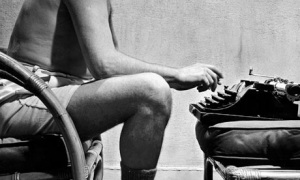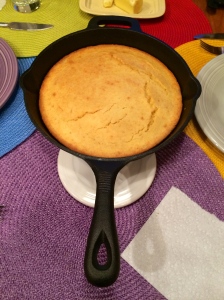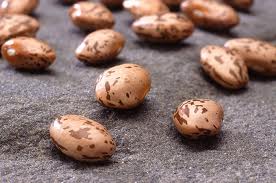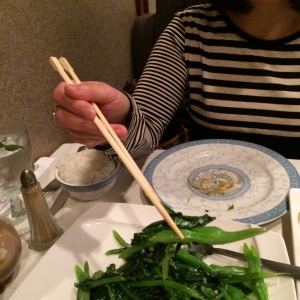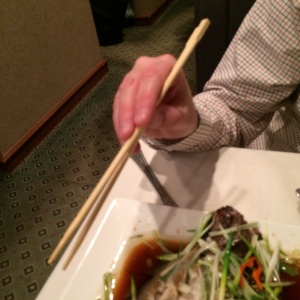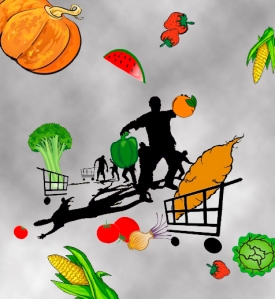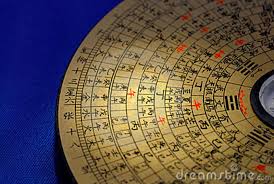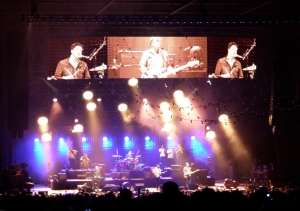When Bovey and I were living in New York, she loved eating at this little sushi restaurant in the East Village. Back then, I did not share her enthusiasm for raw fish.
I’d see a plate of sushi and immediately understand why children burst into tears when you introduce new food to them, like for example, a sinister looking sprig of broccoli.
But for an artist like Bovey, seeing a palette of deep auburn-colored tuna, neon orange salmon and roe, yellow sea urchin, and that little green dab of wasabi, her plate was a visual delight that she savored.
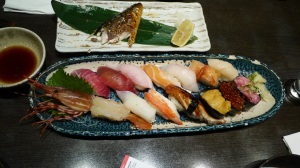
Fortunately, this restaurant offered a variety of cooked foods, too. Of course, when you have one person eating sushi and directly across from them a platter sizzles with teriyaki and chicken, carrots and broccoli, the pungent odors and steam engulfing the table, it’s kind of like going to the movies and listening to your date chatter through the whole film.
I’m sure Bovey wished she had stayed home by herself instead and thawed out a frozen enchilada.
It would be many years of these trips to the East Village and beyond before I ever tried sushi. But that never stopped Bovey from badgering me to try a piece of tuna or maki. To this day she still says I’m a picky eater, even though in my mind, for a Kentuckian raised on meat and potatoes, I believe I’ve taken giant leaps into the great food universe since we’ve been together.
We were long gone from New York, where we lived for four years, and transplanted to Pittsburgh, before I sampled my first piece of sushi. It wasn’t really sushi, though. It was a piece of California roll, Americanized sushi invented in, well, California.
It contained no raw fish, save for little dabs of orange fish roe (raw fish eggs) dotting the rice on the outside. Bovey did not technically lie when she told me there was no raw “fish.” And for some reason it didn’t occur to me to ask what the little orange dots were. They looked harmless enough, almost like sprinkles on a Christmas cookie, not nearly as alarming and intimidating as a fat piece of red, raw tuna.
But to my surprise, the combination of the warm rice, the cool avocado and sweet, imitation crab meat, the saltiness of the dried seaweed and the roe, was a perfect little flavor explosion. As much as I hated to, I had to admit it was tasty.
Bovey grew up in Hong Kong, home to the most adventurous eaters I’ve ever known, and I can tell you from experience, you never know what might show up on Chinese dinner table.
Some of the strangest foods Bovey introduced me to over the years are chicken feet, assorted offering of intestines, hearts, livers, and ears, various roots like lotus and taro, fish sauce, jackfruit, century-old eggs, quail eggs, eggs soaked in tea, dried squid, and fish tofu, lots of meats served with the head still on, like shrimp, fish, lobster, even pigeon and duck.
It’s a bit perplexing when you’re at a Chinese dinner table staring down at the main entree and it stares back at you. Looking into the eyes of a duck or a fish splayed out on the table, I sometimes feel sorry for the little critter.
When I look into their eyes I immediately hear their voices and they say things like, ‘Please don’t eat me’ or ‘Suck my ass’ or ‘I hope you choke on my bones.’
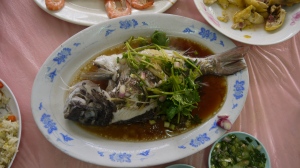
But the Chinese are a practical lot, and you can tell by the way they devour a steamed fish, what they hear in their heads is nothing like what I hear. I imagine their voices say to them, ‘Yum, yum. I’m going to annihilate you, savor every morsel of your succulent body.’
I remember once dining in Hong Kong and watching someone at my table, near the end of the meal, when the fish was stripped so thoroughly the bones gleamed, take a pair of chopsticks and snap the head off the thing and suck on it.
There’s no feeling sorry for the fish.
But once I got over wanting to place a napkin over the fish’s head so he wouldn’t look at me and chatter on and on with his little fish lips, I found this dish to be quite tasty.
And that’s the thing about a Chinese meal, if you see something disagreeable, don’t worry, because with the parade of food they bring to the table, sooner or later there is bound to be something you like, even if you don’t recognize what it is.
When a Restaurant Table Seems More Like An Island
You cannot comprehend how many vegetables exist in this world until you travel to China. I grew up on peas and carrots, potatoes and corn, green beans, the occasional collard greens cooked to within an inch of their lives, but in China they do perfectly well without nearly all of these veggies.
In China, you get bok choi, napa, bamboo shoots, bitter mellon, Chinese broccoli, which by the way looks nothing like broccoli, and Chinese cabbage, which is tipped with these little yellow flowers and also looks nothing like cabbage.
In order to accommodate all the different veggies and dishes that show up at a Chinese meal, you need a large table and in some restaurants in Hong Kong, the tables are about the size of small islands.
Such a large table presents a problem for someone like me and my inferior chopstick skills. At a Chinese meal, there is a lot of reaching with your chopsticks. All the dishes are scattered across the table and everyone takes turns plucking little bites of food from one of the plates in the center of the table and transferring it to his or her rice bowl.
I do fine with chopsticks when I don’t have to stretch to reach something and not wanting to embarrass myself in front of Bovey’s friends and family, I tend to eat only the dishes that are nearest to me. Which kind of sucks if they stick a plate of bitter mellon right in front of me. They don’t call it bitter mellon for nothing.
I remember once reaching across the table for a piece of shumai, the Chinese version of a dumpling. They’re slippery little devils and I fumbled around and had no luck picking it up. I so wanted to just stab the thing with my chopstick and bring it to my plate, but stabbing your food with your sticks is frowned upon at a Chinese meal.
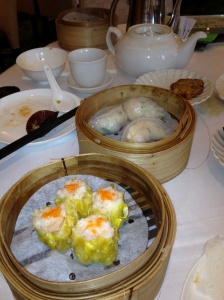
The dish in front is shumai.
Trying to be on my best behavior in front of Bovey’s family, I kept at it. As I continued and kept dropping the dumpling, everyone’s gwailo radar went up, and I felt all eyes at the table on me as everyone paused to watch and see how this would turn out.
The word gwailo, by the way, more or less translates as ghost dude in Cantonese, the language spoken in Hong Kong. Hong Kongers coined the word during the Opium Wars in the 16th century when Westerners began invading China’s shores, and even though the word no longer is used derogatorily, it is still freighted with this history.
So as sweat began to bead up on my forehead, I forged ahead and finally lifted the dumpling from the steam basket and nearly had it to my plate when I dropped it into one of the dipping sauces on the table. It landed with a splat and sprayed soy sauce across the shirts of the dinner guests nearest to me. I wanted to crawl under the table and die.
Those with the Best Chopstick Skills Get the Most to Eat
When you arrive for a Chinese meal, you immediately notice the place settings, which compared to Western place settings, look a little sparse. At a Chinese meal, you get one spoon and one set of chopsticks. You also get a tiny bowl, about the size of an ice-cream bowl, a saucer about the size of a dessert plate and a little thimble-sized tea cup. Everything is so tiny and cute like something out of Alice in Wonderland.
There’s not eighteen different forks and spoons of various sizes like you get in some Western restaurants, so you never have to worry about embarrassing yourself by using the wrong utensil.
As soon as the first pot of tea arrives at the table, one person will usually scoop up all the bowls, tea cups and chopsticks and begin washing them by pouring the steaming hot tea over everything. With the prevalence of bird flu and whatnot in Hong Kong these days, no one trusts the restaurant to supply clean utensils. Once everything is cleaned, all of the place settings are redistributed.
One thing you learn early on at a Chinese meal is this: the people with the best chopstick skills are the ones who get the most to eat.
At a Chinese meal, all of the entrees are served in the middle of the table and since you don’t have a big dinner plate, you can’t immediately pile up a bunch of food in front of you like we do in America, and bury your head in your plate until it’s clean.
Which for me creates new dilemmas I never have to worry about in an American restaurant. Number one, in America, once the waiter brings your plate, you know exactly what you’re going to eat. It’s all right in front of you.
At a Chinese meal, you have to compete with everyone else at the table to get some food and sometimes at a large table, you can’t even reach everything.
It’s at times like this that it’s nice having a Chinese wife with excellent chopstick skills. If there’s something I want that I can’t reach or I think is too slippery for me to get onto my plate without slinging it on somebody, I can always ask Bovey to get it for me.
You see this a lot at a Chinese table, everyone helping each other out with reaching for the food. By the way, I’ve also learned you can earn a lot of brownie points with the in-laws and grandmothers when you put food onto your wife’s plate, so I always make a point to flop a piece of fish or some broccoli onto Bovey’s plate.
My technique is not great but the grandmothers think it’s cute when a gwailo demonstrates he can handle himself at a Chinese table.
I’ve also learned by watching the Chinese diners around me that most Chinese fill the little bowl you get with your place setting with rice. Then they use their chopsticks to lift little bites off the entree plates and put them on top of the rice.
With all the rice in your tiny bowl, it leaves only enough room for a couple bites of meat and veggies at a time.
And the locals, with their advanced chopstick skills, take the little bowl in one hand and hold it under their lips and windmill their sticks through the bowl in a scooping motion, sliding the rice and bits of meat and vegetables into their mouths.
Watching the locals eat this way, I understood immediately how much more efficient their methods were, but I was taught never to lift anything off the kitchen table other than my fork or spoon, so I felt uncomfortable holding the bowl in my hand and mostly left it on the table and picked at the rice and other food with my chopsticks.
I always wondered why a society that included so much rice in their diet would want to eat with two long sticks. You ever try eating rice with chopsticks? It’s a very inefficient way of eating, at least if you combine chopsticks with Western etiquette. It takes you all day to eat a bowl of rice unless you’re willing to pick up the bowl and use the sticks to scoop the food.
By watching everyone else at the table, I also quickly realized that the little saucer you get doesn’t seem to have much purpose, other than to pile up bones and discarded bits of fat and grizzle and anything else that is inedible.
Chinese love to serve their meats with the bone still on because the bone is what gives the meat the best flavor, they will tell you. You rarely get any kind of meat served off the bone.
Once at a meal in Hong Kong, the waiter brought a whole chicken to the table only it was chopped up into small, bite sized pieces. For a gwailo like me, who is used to big, long chicken bones, the first time I saw this dish, I didn’t think there were bones because the pieces were so small. It looked boneless.
But what I did not know, in every Chinese kitchen there is an assassin wielding a cleaver the size of New Hampshire, who whacks right through the bones, chopping the entire chicken into little individual chunks that are easily handled with a pair of chopsticks.
So imagine seeing a steaming hot plate of chicken which kind of looked like chicken nuggets but without the breading. I went straight for it and tossed a little chunk into my mouth and bit down hard.
That’s when the bone hidden under the meat nearly punctured a hole in the roof of my mouth.
Once I recovered from the shock of nearly driving a chicken bone into my brain, my instinct was to spit out the bite and carve the meat from the bone, when it occurred to me, ‘How am I going to do that with just these chopsticks?’
Then I noticed everyone at the table put the bites of chicken into their mouths bone and all and kind of rolled it around on their tongues and gnawed on it until they cleaned all the meat off then plucked the bone off their tongue with their chopsticks and put it onto their little saucers.
Everyones’ saucers started to pile high, and I realized it would have been nice to have a plate like this growing up. At the meal, whenever I sampled something I didn’t like, I merely hid it under the bones stacked on the saucer and no one at the table noticed.
When I was a kid, if I thought something was yucky and wanted to spit it out, I had to either put it in my pocket or try and slip it under the table to our dog. With either choice, I risked my father’s wrath or getting a lecture about wasting food when people were starving all over the world.
A Chinese meal also presents another dilemma for a shy person like me. When I’m at a meal with a bunch of people, sometimes I want to stare down at my plate and not worry about making conversation. The giant plate of food in front of me almost becomes a shield I can bury my face in and pretend I’m too absorbed in enjoying the food to participate in chit chat.
Well, eating Chinese style, there’s no burying your face in your plate because you’re constantly looking up trying to find something else to eat, and inevitably you catch someone’s eye and they ask you to tell them something about yourself, or something asinine like that, which can make for lively dinner conversation, but is a total nightmare for a shy person like me.
Walk into any Chinese restaurant in Hong Kong and you immediately notice the level of conversation. It’s like that old television commercial advertising Maxell cassette tapes, where the “Blown Away Guy” is sitting in a chair in front of a speaker listening to Ride of the Valkyries and it’s so loud and clear the wind from the speaker blows his hair back.
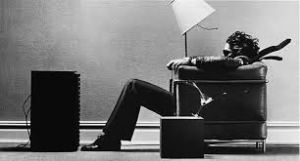
It’s like that when you walk into a restaurant just about anywhere in China. The cacophony of voices and banter hits you in the face like this great surge of energy.
Fortunately, I don’t speak a lot of Cantonese, so all I have to do is laugh when everyone else laughs and nod my head yes or no from time to time. Not knowing the language gives me a free pass from participating in the conversation.
But I also miss out on a lot and sometimes I can tell by the laughter, or tell by the passion, or the guess-what-I-heard tone in someone’s voice, that I’m missing some pretty juicy bits. I always elbow Bovey and ask her what’s going on but she’s usually so caught up in the conversation, she has no time to explain and will say something like, “Oh, we’re just talking about so and so.”
Of course, I realize she’s skipping all the good parts, leaving me wondering what all the hullabaloo is about until I can get her alone after the meal and she fills me in on all the details.
Usually at one of these meals, I’ll get my thirty seconds to add to the conversation. Everyone will stop talking and look at me with expressions that say, ‘Okay, let the gwailo say something so we can get back to our conversation.’ Then immediately after I finish, they all pick up the thread of gossip they left off earlier, as if to say, ‘Thank you. If we require anymore of your input, we’ll let you know.’
I get the feeling sometimes I’m like a child. In Chinese culture, they say children are better seen not heard. Maybe it’s the same way for the gwailo in the family.
There’s a definite pecking order at the table and with all the catching up everyone has to do, it’s more or less understood that what the elders and the locals have to say is much more important.
So I stare at the bounty of food in front of me feeling a bit hungry and I listen to all the chatter. I watch Bovey and when she stands up and excuses herself to go to the bathroom, I have a little panic attack, and the voice in my head says, ‘Please, don’t leave. I can’t reach that plate of pig ears I’m dying to try.’

